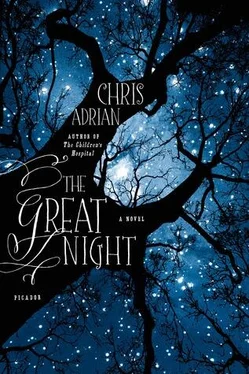When he came home, Carolina had dinner waiting for him, a meal made up entirely of foods that Sean had liked, that they could enjoy together on his behalf, the menu assembled over the past few months from questions she’d asked so subtly that he had no recollection of answering them. She handed him a note that said Surprise , because it wasn’t the sort of occasion where that should be shouted out, or to which one invited guests, and yet she had wanted to surprise him with something nice. “Well,” she said, lighting candles all down the table, “nice is probably the wrong word, but you know what I mean.” And taking his hand as she sat him down she said, “You are probably the only person who knows what I mean.” He nodded at that, though he didn’t think it was true — weren’t there countless millions of bereaved brothers and sisters out there who would know just how it was pleasant and unpleasant in exactly the right way to sit down to such a feast on the anniversary of a death, to not exactly celebrate the death and not exactly mourn the life with carrots and Pop-Tarts and mashed potatoes and Mississippi Mud Pie? But maybe he only wanted it to be untrue, because he didn’t deserve to be so distinguished, and did not deserve this gesture of something related to but much, much better than sympathy, and was not worthy of anything of hers, not her beauty or her generosity or her home or her wonderful tree or even, eventually, her woundedness, her fury, her disgust.
H enry took extended refuge in Bobby’s apartment, though they never quite officially moved in together, Henry having always maintained a separate residence even when he spent almost every night in Bobby’s bed. The closest they came was living next door to each other; they had planned to share both apartments but the breakup sundered their bachelor households before they could really be joined. Bobby’s continued closetedness and Henry’s continued terror of invisible filth made actually moving in together complicated: Bobby needed someplace that could, with the push of a button, become a straight man’s apartment should his parents come to visit, and Henry needed someplace where he could mop and scrub to his heart’s discontent in his continued losing effort to eradicate the invisible contamination still radiating from his mother and from the West.
He rented his new apartment from a pleasant muttering gentleman named Bilbo, who was shy and retiring but not short or hairy-footed. It was the first home Bilbo had owned with his wife, a seventies love nest whose chocolate brown carpet had been replaced and whose burnt orange walls had been repainted, but there was still something about the place — a three-story loft with a floating teak staircase and track lighting even in the bathroom — that always made Henry feel like he should prance around it in a caftan. It had twelve hundred square feet of moppable wood floor, some of which was quite old, and the whole apartment was kind of dingy. Henry scrubbed and mopped and bleached all day when he moved in, a complicated process because his old apartment had become contaminated by a sixth- or seventh-degree touch from his mother, so he scrubbed each object that made the five-block journey between apartments with the aqua regia of his obsession, a mixture of ammonia and water with a teaspoon of bleach (just enough to increase the disinfecting power of the solution without generating a deadly gas) and three dashes of rosemary shaken from a spice bottle. He didn’t know why the rosemary was required, though it made as much sense, or nonsense, in its way as the ammonia and the bleach, since he wasn’t concerned at all about bacterial contamination. Bobby had pointed out that he routinely left food to rot on his counter, and he ate from moldy dishes and drank spoiled milk. But if he happened to leave out the rosemary, or even failed to count how many dashes he’d shaken into the bucket, he’d have to clean everything all over again.
He started on the bottom floor, with two buckets, one for the mop and one for the sponge, wiping the walls and doors down and then mopping himself backward to the stairs. The first floor was just the foyer, a couple of closets, and the door to the basement. He had swiped here and there in the vestibule but not tried very hard to make it actually clean: he shared it with another apartment, a studio where Bilbo’s frail aged sister lived, whose spotted claws would be all over the mailbox and probably the ground outside, thence to touch the walls and mirror as she leaned and heaved, breathless after the five steps from her threshold to the stoop. She might even lean on his door or try his knob in confusion, so it was useless to try to make any of those common surfaces safe to touch; he’d have to clean them again as soon as they had come and gone from his sight. He polished his inside doorknob with the sponge until it dripped.
“Let’s get a dog,” Bobby had said, a few months before.
“That’s a terrible idea,” Henry said. When he saw how Bobby’s face fell, he added, “I mean, it’s a little soon. Maybe when I’m better. Or more better. I’m getting there.” He said something about how it would be unfair to make the dog wear shoes when it went outside, or a surgical mask to keep its sniffing nose from ever actually touching the ground.
“Maybe,” Bobby said, “the dog would make you better. Like if you loved it enough, all this stuff wouldn’t matter anymore. Because it would get a pass on the contamination, you know? Like it would have happiness on its paws instead of dirt.”
“I don’t think that’s how it works,” Henry said, though of course that ended up being exactly how it worked. “I do love dogs.” That was true: he loved them as a category but was scared of them specifically, mostly because their adorable paws were always on ground that was trod by postman’s shoes that were contaminated by dropped letters and the elixir of filth that had dripped from his old mailbox when a letter from his mother had stewed for days in rainwater. His Cambridge mailman had become his archenemy. Henry tried to avoid him, but every now and then he got caught on the street and scolded for never emptying his mailbox of circulars and flyers and the occasional bill that slipped through. “No, thank you,” Henry said, as if to decline the mailman’s anger, or as if the mailman were the manifestation of whatever agency sought to connect him back to his mother and the whole great contaminated state of California. Just before Henry had moved to Bilbo’s, the mailman had accused him of hiding his mail cart, because it disappeared just as Henry was walking down the little garden path (surrounded by reaching hedges that he had become skilled at dodging), trying to avoid being noticed and talked to because there had already been an exchange that week and an ultimatum given, which hinted at dangerous depths of postal rage. There was a dog, a friendly and dumb-looking black Lab, sitting where the cart had been, as if someone had exchanged them one for the other. Henry worked himself into a tizzy of worry that the mailman might touch him, a finger to his chest or a shove against his head, or that the dog, watching and wagging his tail, would come over and put his paws on him. But as the mailman closed on him, actually shouting now, the dog growled and leaped for him, not bothering Henry. He chased the mailman down the street, not seeming to mind at all the backward puffs of mace that came like toxic blinding farts from the vicinity of the mailman’s ass. Henry hurried away and moved soon after out of that delivery zone.
“It’s too soon, I think,” Henry said to Bobby, standing with him next to a bench that neither of them was allowed to sit on, in a park full of frolicking dogs. “But maybe not much longer. I’m getting better, right?”
Читать дальше












